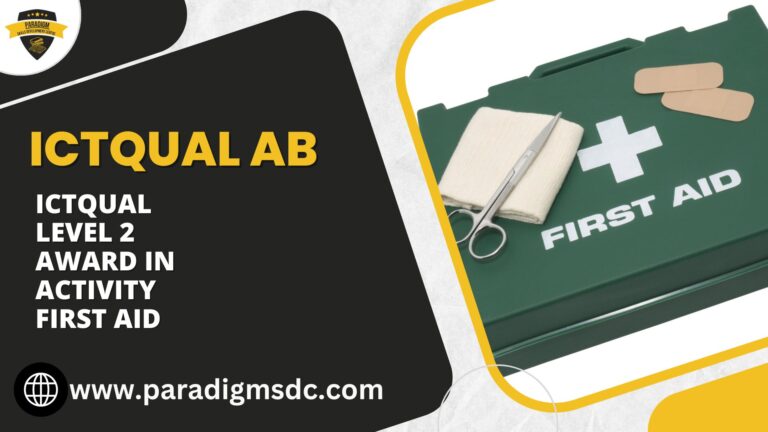Course Introduction
The ICTQual Level 3 Award in Understanding the Principles and Practices of Assessment is designed for individuals looking to gain a comprehensive understanding of assessment principles and practices in various educational and vocational settings. This course is ideal for those new to assessment roles or seeking to formalize their knowledge and skills with a recognized qualification. It provides a robust foundation in the theoretical and practical aspects of assessment, preparing participants to effectively evaluate and support learners’ progress.
Course Overview
The ICTQual Level 3 Award in Understanding the Principles and Practices of Assessment offers an in-depth exploration of the key concepts, methods, and principles involved in the assessment process. The course combines theoretical knowledge with practical application, ensuring that participants can confidently implement effective assessment strategies in their professional roles. This qualification is suitable for assessors in both work-based and vocational education environments.
Course Study Units
- Understanding the Principles and Practices of Assessment
- Different Types of Assessment Methods
- Planning and Conducting Assessments
- Providing Feedback and Support
- Quality Assurance in Assessment
Learning Outcomes
By the end of this course, participants will be able to:
Understanding the Principles and Practices of Assessment
- Explain the Purpose of Assessment: Understand and articulate why assessment is a critical component of the learning process.
- Define Key Principles of Assessment: Identify and explain key principles such as validity, reliability, fairness, and transparency.
- Differentiate Types of Assessment: Distinguish between formative and summative assessments and describe other types such as diagnostic and ipsative assessments.
- Understand Roles and Responsibilities: Define the roles of assessors and outline the ethical considerations involved in assessment practices.
2. Different Types of Assessment Methods
- Identify Various Assessment Methods: Recognize and describe different assessment methods, including observation, questioning, portfolio assessment, and tests/exams.
- Evaluate Assessment Methods: Assess the strengths and weaknesses of different assessment methods in various contexts.
- Select Appropriate Methods: Apply criteria to select the most suitable assessment methods based on specific objectives and learner needs.
- Design Effective Assessment Tools: Create and implement effective assessment tools and instruments tailored to the learning outcomes.
3. Planning and Conducting Assessments
- Develop an Assessment Plan: Create a comprehensive assessment plan, including setting objectives, selecting methods, and scheduling assessments.
- Conduct Fair and Reliable Assessments: Execute assessments effectively, ensuring fairness, reliability, and validity throughout the process.
- Engage Learners in the Assessment Process: Implement strategies to involve learners actively in the assessment process and encourage their participation.
- Maintain Accurate Records: Keep precise and thorough records of assessment decisions and learner performance.
4. Providing Feedback and Support
- Deliver Constructive Feedback: Provide feedback that is constructive, actionable, and supports learner development.
- Utilize Various Feedback Techniques: Use different techniques to deliver feedback, including oral, written, and digital formats.
- Address Individual Learner Needs: Tailor feedback to meet the individual needs of learners and provide support to help them improve.
- Plan Follow-Up Actions: Develop and implement follow-up actions after providing feedback, including setting goals and planning for reassessment if necessary.
5. Quality Assurance in Assessment
- Understand Quality Assurance Principles: Explain the importance of quality assurance in the assessment process and the principles that underpin it.
- Implement Internal Verification Processes: Carry out internal verification processes to ensure the consistency and reliability of assessment decisions.
- Engage with External Verification: Understand the role of external verifiers and how to collaborate with them to maintain assessment standards.
- Promote Continuous Improvement: Use quality assurance data to identify areas for improvement and implement strategies to enhance assessment practices and learner outcomes.
Course Benefits
- Enhanced Assessment Skills: Gain the knowledge and skills required to conduct effective assessments.
- Career Advancement: Improve employability and career progression opportunities in education and vocational training.
- Professional Recognition: Achieve a recognized qualification that validates your assessment expertise.
- Effective Feedback: Learn to provide feedback that supports learner development and achievement.
- Quality Assurance: Ensure your assessments meet high standards and comply with legal requirements.
Who is this Course For?
This course is ideal for:
- Aspiring assessors looking to enter the field of education and vocational training.
- Current assessors seeking to formalize their skills and knowledge with a recognized qualification.
- Teachers, trainers, and educators involved in learner assessment.
- HR professionals and training managers responsible for employee development.
- Anyone interested in understanding and implementing effective assessment practices.
Future Progression
Upon completing the ICTQual Level 3 Award in Understanding the Principles and Practices of Assessment, participants can further their career development by:
- Pursuing higher-level qualifications, such as the ICTQual Level 3 Certificate in Assessing Vocational Achievement.
- Gaining experience and seeking advanced roles in education and training, such as lead assessor or internal quality assurer.
- Engaging in continuous professional development through workshops, seminars, and additional certifications.
- Exploring opportunities in related fields, such as educational consultancy, training and development, or quality assurance.
- Contributing to the development and implementation of assessment policies and practices within their organizations.
The ICTQual Level 3 Award in Understanding the Principles and Practices of Assessment provides a solid foundation for anyone looking to excel in the field of assessment. By mastering the skills and knowledge covered in this course, participants can ensure their assessments are fair, valid, and effective, ultimately contributing to the success and development of their learners.







